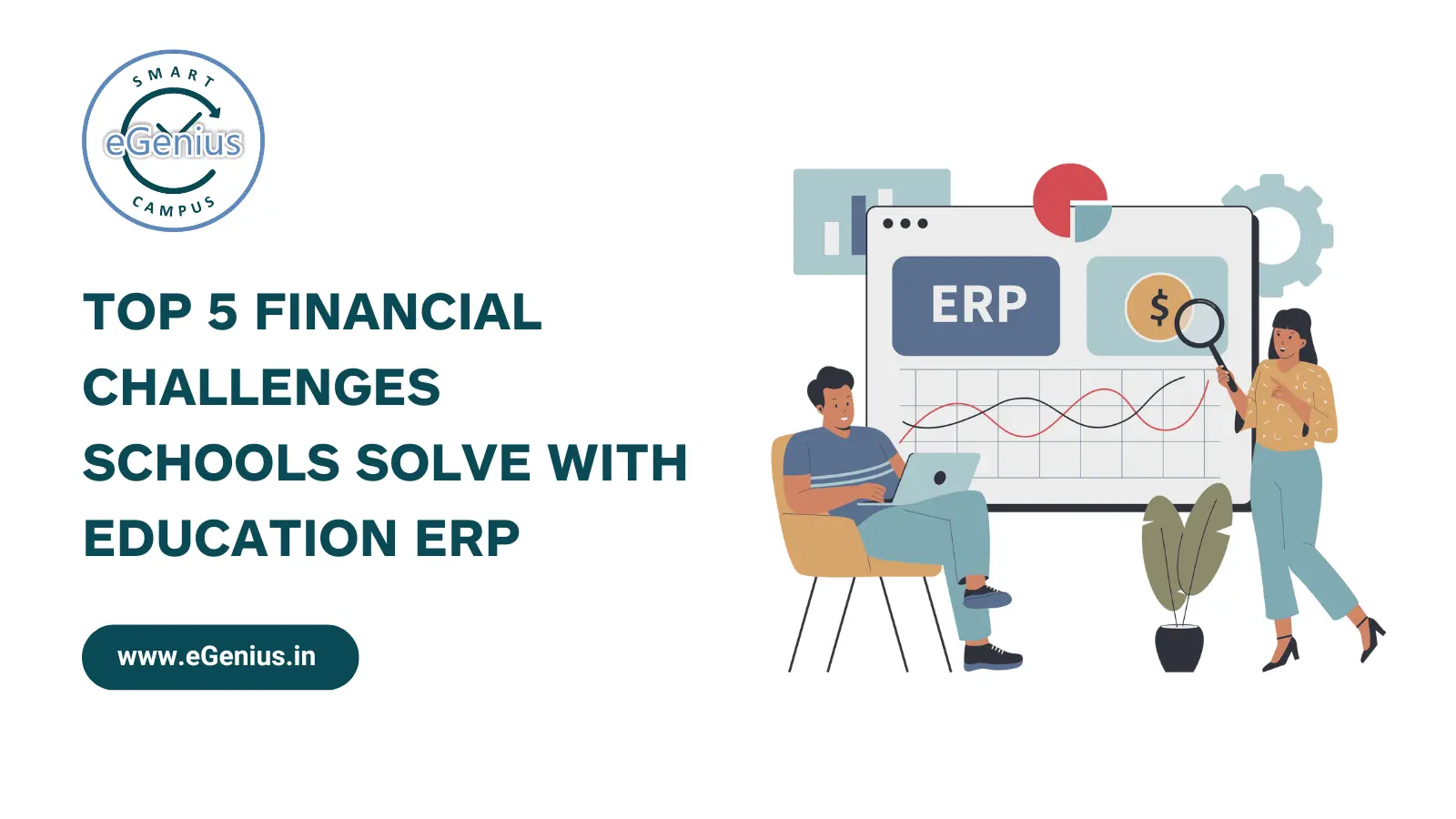For educational institutions, managing finances is as crucial as controlling the quality of education they provide. Many schools grapple with fee collection, budgeting, payroll management, and asset tracking issues. If not handled effectively, these financial challenges can strain resources, impact cash flow, and affect overall operations. With the adoption of Education ERP (Enterprise Resource Planning) systems, schools can streamline these financial processes, reduce errors, and ensure efficient use of funds.
Education ERP systems are designed to manage multiple functions, including finance, administration, and student management, on a single platform. By addressing financial challenges head-on, these systems help schools maintain a strong financial foundation and improve operational efficiency. Here are schools’ top five financial challenges and how Education ERP systems provide solutions.
Challenge 1: Managing Fee Collection and Payments
Fee collection can be complex and time-consuming, especially for large institutions. Schools often manage different types of fees, such as tuition, library, sports, and examination fees. Without a robust system, tracking these various payments becomes a hassle. Education ERP systems simplify fee collection by providing a centralized platform that automates payment processing and tracking.
- Automated Fee Reminders
Education ERP systems enable schools to set up automated reminders to parents and students regarding upcoming fees, minimizing late payments and improving cash flow.
- Multiple Payment Options
By integrating various payment gateways, Education ERP allows parents to pay fees conveniently through credit cards, debit cards, bank transfers, and even digital wallets, enhancing user experience.
- Real-Time Payment Tracking
With Education ERP, administrators can monitor payments in real time, allowing them to identify any pending payments or discrepancies quickly.
- Reduced Manual Errors
Since fee collection is automated, the likelihood of manual errors is greatly reduced, ensuring accurate financial records.
- Transparent Fee Management
Schools can communicate transparently with parents about fee structures and dues through Education ERP, building trust and reducing conflicts.
Challenge 2: Budgeting and Expense Tracking
Creating a well-planned budget and ensuring adherence to it is vital for any educational institution. However, budgeting is tedious and often prone to miscalculations or unanticipated expenses. Education ERP systems facilitate accurate budgeting and efficient expense tracking to help schools make better financial decisions.
- Centralized Expense Management
Education ERP consolidates all expenses into a single platform, providing a holistic view of finances and enabling effective budgeting.
- Expense Forecasting
The predictive analytics features in Education ERP help schools forecast future expenses by analyzing past spending trends and assisting administrators in preparing realistic budgets.
- Customizable Budgeting Modules
Schools can tailor the budgeting module to their unique needs, assigning funds to different departments, activities, or projects based on requirements.
- Expense Monitoring
Education ERP allows schools to monitor expenses in real-time, making it easier to identify areas of overspending and adjust the budget accordingly.
- Improved Financial Accountability
Schools can improve accountability with centralized budgeting by providing stakeholders with clear, up-to-date financial data.
Challenge 3: Payroll Management with Education ERP
Payroll management in schools can be complex, considering the variety of staff involved, including full-time teachers, part-time staff, and temporary employees. Education Management System Software simplifies payroll management, ensuring timely payments, accurate deductions, and compliance with tax regulations.
- Automated Payroll Calculations
With Education ERP, payroll calculations become automated, reducing the chances of errors and ensuring that each employee is paid accurately.
- Flexible Payroll Setup
Schools can configure the payroll system to suit various employment types, effectively managing differences in salary structure, allowances, and deductions.
- Tax Compliance
Education Management Software systems integrate tax deduction processes, ensuring compliance with local regulations and reducing the risk of tax penalties.
- Simplified Attendance Integration
Payroll in Education ERP is often linked to attendance data, automatically adjusting pay based on attendance records, which saves time and improves accuracy.
- Transparent Payslips and Records
Staff can access detailed payslips, and HR departments can easily retrieve payroll data, reducing administrative overhead and enhancing transparency.
Challenge 4: Inventory and Asset Management
Schools manage various assets, from classroom furniture and laboratory equipment to computers and sports facilities. Managing these resources effectively is essential for both cost savings and optimal utilization. Education Management Software provides tools to manage and track inventory and assets efficiently.
- Centralized Asset Tracking
Education ERP systems centralize asset tracking, helping schools monitor all assets’ status, usage, and condition from a single platform.
- Efficient Stock Management
Schools can manage inventory levels, set reorder points, and avoid stock-outs of essential supplies, such as stationery and laboratory equipment, through Education Management Software.
- Improved Maintenance Scheduling
With ERP, schools can schedule maintenance for valuable assets, such as computers and laboratory equipment, to prolong their lifespan and reduce replacement costs.
- Asset Depreciation Management
Education ERP systems allow schools to calculate and track asset depreciation, which helps in accurate accounting and financial planning.
- Reduction of Resource Misuse
By keeping detailed inventory records, Education ERP reduces misuse, ensuring that resources are utilized only for the intended purposes.
Challenge 5: Financial Reporting and Compliance
Financial transparency is crucial for schools, especially when dealing with public funds or donations. Education Management Software systems streamline financial reporting, ensuring compliance with regulatory standards and enabling accurate financial analysis.
- Automated Report Generation
Education ERP systems generate financial reports automatically, saving time and providing stakeholders with timely, accurate data.
- Customizable Reporting Options
Schools can customize financial reports to meet the specific needs of various departments or stakeholders, enabling more detailed analysis.
- Enhanced Compliance with Standards
Education Management Software helps schools adhere to local and international financial standards by maintaining up-to-date records and automating compliance reporting.
- Audit Trail Management
Education ERP systems maintain detailed logs of financial transactions, facilitating audits and improving accountability.
- Insightful Financial Analysis
The analytics features in ERP provide insights into spending patterns and financial health, enabling better decision-making.
In today’s educational landscape, managing finances efficiently is as essential as delivering high-quality education. Education ERP systems offer comprehensive solutions to tackle schools’ various financial challenges, from fee collection and payroll management to budgeting and compliance. By automating financial processes and centralizing data, Education Management Software enables schools to streamline operations, reduce errors, and ensure financial accountability. Schools adopting ERP systems improve their financial health and enhance overall operational efficiency, freeing up valuable time and resources to focus on their primary goal—delivering quality education.















